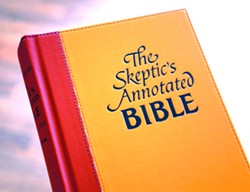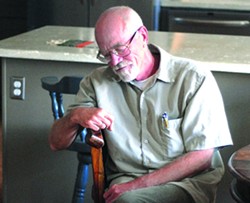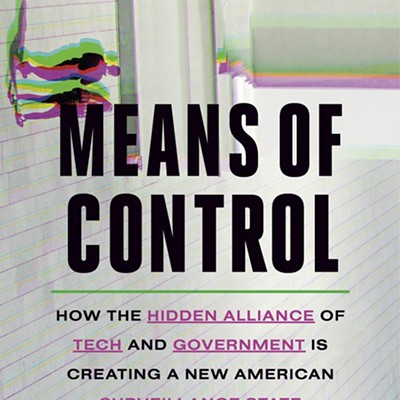Hands down the Bible ranks as one of the best selling and most widely distributed books in the world, but how many people have actually read it, and not just bits and pieces, but every word?
When Steve Wells, 61, of Moscow sat down to read the King James Version, he started highlighting things that were interesting to him, or that bothered him, were good, or seemed absurd. The more he read the more astounded he was by just what the Bible says.
Wells’ resulting book, “The Skeptic’s Annotated Bible,” self-published this year, is receiving international attention. The book broke the top 100 Amazon bestsellers earlier this week after a Tweet about it by Sam Harris, a contemporary critic of religion and author of the New York Times best seller, “The End of Faith.” Harris has said it belongs in every hotel room in America.
This week 100 copies of Wells’ book were delivered to Georgia where a debate over Bibles in a state-run lodge is playing out. Last May, a man named Ed Buckner, former president of a group called American Atheists, complained to state officials about finding nine Gideons Bibles in the three-bedroom lodge he rented. The Bibles were removed before the governor of Georgia ordered them returned, saying they were donated and not paid for by the state and any group was welcome to donate literature. Buckner is taking the governor up on his word.
The Bible isn’t the only religious text Wells has tackled. He’s also annotated the Book of Mormon and the Quran on his website, skepticsannotatedbible.com, which he’s maintained for more than a decade. He writes about his readings at his blog, Dwindling in Unbelief. People from around the world comment daily on his work.
“I’m just a regular person who read the Bible and was troubled by what I read,” says Wells.
When Missionaries Come Knocking
When missionaries from various religions knock at Wells’ door he is genuinely excited to invite them in to talk. Often the first verse he quotes is Deuteronomy 13:6-10. Usually, he says, they are unfamiliar with it.
“If thy brother ... or thy son, or thy daughter, or the wife of thy bosom, or thy friend, which is as thine own soul, entice thee secretly, saying, Let us go and serve other gods ... Thou shalt not consent unto him ... neither shall thine eye pity him ... But thou shalt surely kill him; thine hand shall be first upon him to put him to death, and afterwards the hand of all the people.”
“It would be hard for me to even come up with something more evil than that,” says Wells. “As a believer, I would have a problem with rationalizing that.”
In his annotated Bible, Wells includes the verse under contradictions. Elsewhere in the Bible it says to love and be kind to disbelievers, another verse says to shun them. Here, he notes, it clearly says kill them. With multitudes of people claiming that the Bible is the inerrant word of God, Wells thinks it’s worthwhile to point out the obvious inconsistencies, and the disturbing parts, like verses in Exodus, Leviticus and Matthew that say children who curse their parents should be executed.
Verses like these, he writes in the introduction to his Bible, “make us all glad that we don’t actually get our morals and sense of justice from the Bible.”
Besides contradictions, Wells’ other categories include absurdity, intolerance, misogyny and insults to women (“the Bible has plenty to say about women, and nearly all of it is insulting”), good stuff (“surprisingly little for such a big book”), sex, conflicts with history and science, cruelty and violence, and others.
If he had to pick one reason to reject the Bible outright, he says, it would be its cruelty and God’s role in the violence. Wells’ first book “Drunk with Blood: God’s Killings in the Bible” is now in its second edition. In it, he outlines God’s killings in his straight-forward manner with a twist of humor. When tallied in total, God’s estimated Bible victims, according to Wells, would be 2,821,364. In comparison, Satan kills 10 people, but even these he shares with God, Wells notes, since God allowed him to do it as part of a bet in Job. If the book’s title seems harsh it comes from words God uses to describe himself in Deuteronomy 32:42.Wells believes that if people really knew what was in Bible, they wouldn’t believe in it anymore.
A Short Journey of Belief
The hammer critics most often use against Wells’ website and books is that he is not a trained theologian. Wells is a retired statistician who worked at the former AMI Semiconductor in Pocatello. He moved to Moscow in 2000 when his wife enrolled in law school at the University of Idaho.
Wells agrees, he doesn’t have the degrees of a biblical scholar, but if the Bible is the inspired word of God, everyone should be able to read it. If it isn’t the word of God, everyone should be able to read it. One shouldn’t need special qualifications.
Another accusation is that he cherry-picks phrases and takes them out of context. “I pick all the cherries. I shake that tree pretty hard,” Wells says. “Context almost always makes it worse.”
Wells was raised in a non-religious family. By age 12, he considered himself an atheist. Then, around the time he graduated from high school, his sister converted to Catholicism. Wells began attending church with her, read the New Testament and found himself attracted to Christianity. He was baptized Catholic and entered the seminary intending to become a priest. He lasted about four months. He says he spent most of his time arguing with his professors about evolution and other issues he couldn’t rectify, including the belief in the damnation of non-Catholics.
“I had a hard time thinking of my family and friends going to hell,” says Wells. “If I had doubts then I had no business being a priest.”
He didn’t lose faith at that time, however. He married a Catholic and they had four children subscribing to the strict Catholic belief in forgoing all methods of birth control.
Wells distinctly remembers the moment when his faith hit a dead end. He was driving home from a camping trip in 1988 with his family when he suddenly said to his wife, “I just don’t believe this anymore and I’m not going to pretend.”
Not only would he not pretend, he told her, he was going to act.
She spent a week trying to convince him otherwise, then she told him she wasn’t going to pretend and she didn’t believe it either. Not long after that, Wells’ sister told him she was now becoming a Jehovah’s Witness. Wells was determined to talk her out of it and thought the most effective way to do that was to read the Bible. He didn’t succeed in changing her mind, but reading the Bible changed his life.
“He believes someone needs to be doing this — doing this writing and having this discourse. It ought to be in the marketplace of ideas and right now it isn’t,” says his wife, Carole. “He’s passionate about it and as we go along, I find he’s pretty good at it — pointing things out for what they are.”
When her husband first started his project he went to several publishers and was told his idea was too big, too expensive, too cost prohibitive, she says, “and in the end it was, ‘Why you, you’re kind of a nobody.’ He just kept at it and it’s turning out. He did it. He did it before anybody else.”
Going Forth
Wells continues to add annotations to the Bible on his website. Annotations to the Book of Mormon and Quran are also works in progress. He says he’ll have to think long and hard about putting his comments on the Quran in print. It’s more violent than the Bible, he says, and could be summed up to “and for the disbelievers God has prepared a terrible doom.”
Overall he says he’s had “surprisingly few” threats from anybody about his work. He’s already planning a second edition of the “Skeptic’s Annotated Bible.” An audio version of “Drunk with Blood” is to be released and a Kindle version of both books is in the works. He’s in the midst of writing “Strange Flesh,” a book about the Bible’s contribution to the homosexuality debate.
Wells says he sometimes has mixed feelings about what he is accomplishing but overall he thinks it is good.
“I would like people to take what is good from whatever source. I think it is wrong and dangerous for people to believe in things for which there is no evidence,” he says.
Wells’ books are available online and at BookPeople of Moscow where he will sign copies of his work at 11 a.m. Saturday, Aug. 17.
if you go WHAT: Steve Wells signing copies of “The Skeptic’s Annotated Bible” WHEN: 11 a.m. Saturday WHERE: BookPeople of Moscow, 521 S. Main St., Moscow ALSO: At 5 p.m. Boise author Josh Gross will sign copies of “The Hack,” a comedic novel about two estranged brothers trying to heal their fractured relationship through a mutual scheme to get themselves sent to prison. Gross is a reporter at the Boise Weekly and has published more than a dozen short stories in literary magazines.





















